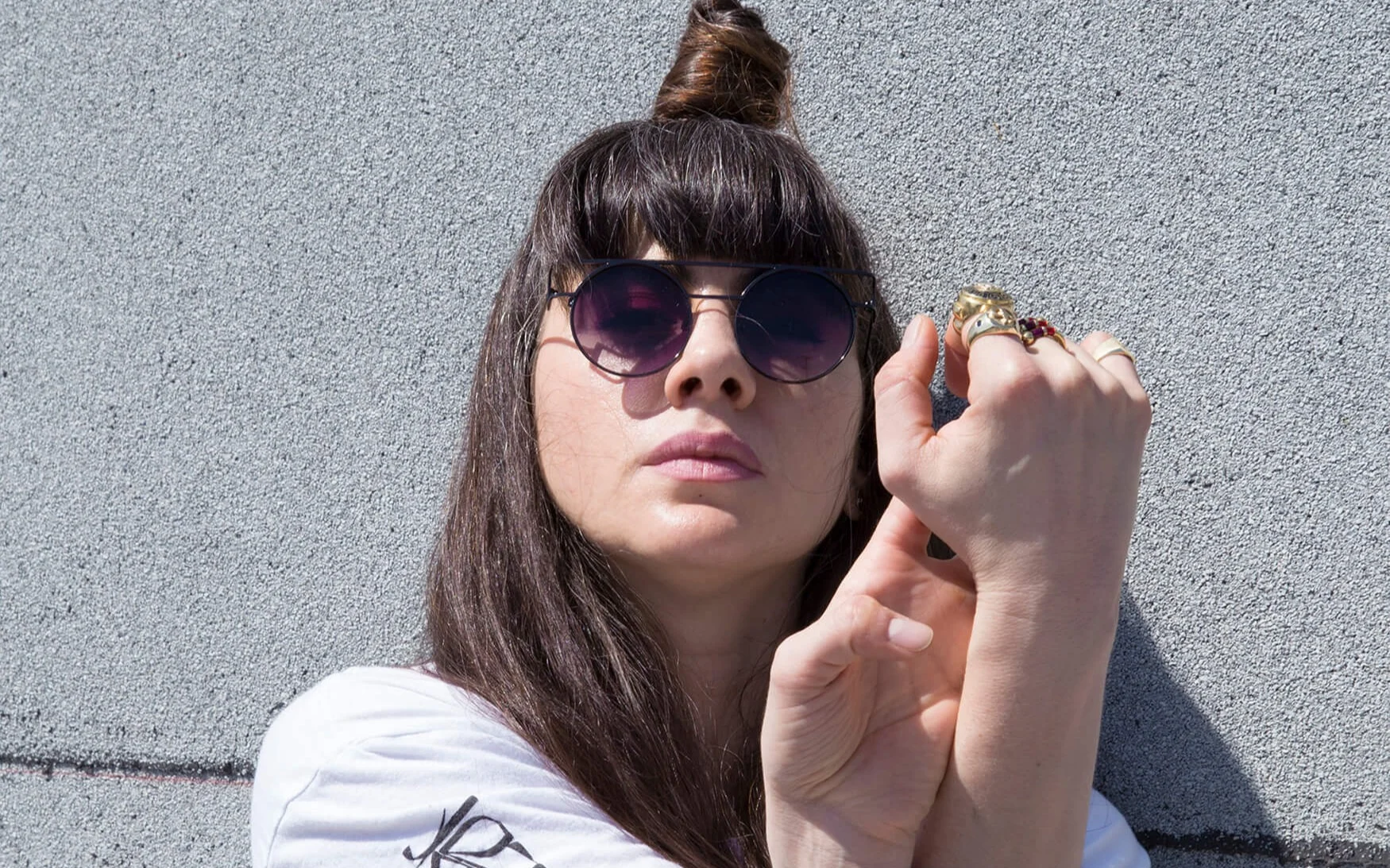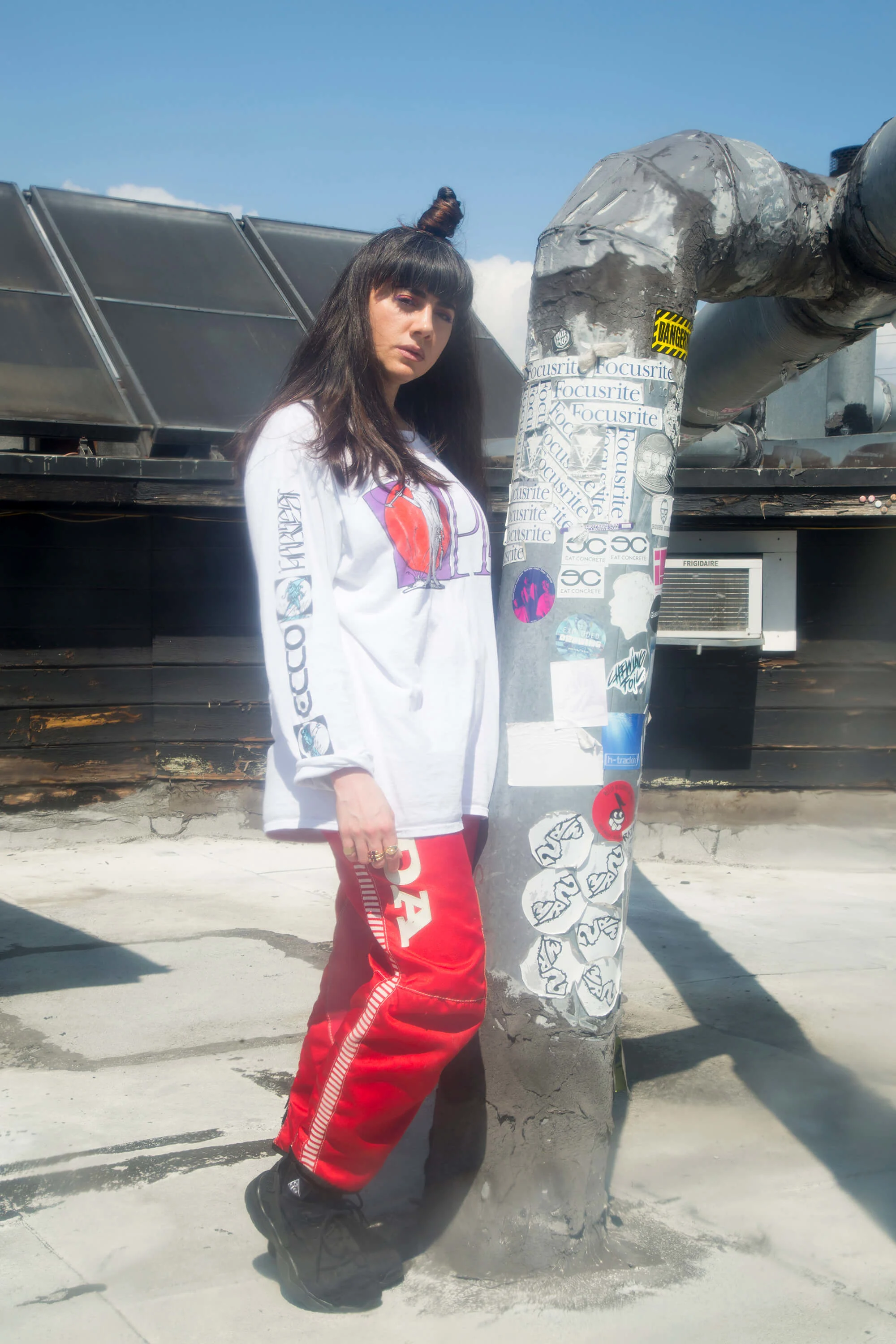
Drawing on Armenian, Syrian and US influences, Káryyn makes music that sounds like nothing else out there. Liz Ohanesian went to meet her in LA to talk about her debut album, her roots and her artistic journey.
Photography by Yasmina Hilal.
Káryyn is less than 48 hours away from the drop of The Quanta Series, her debut full-length record and a collection of songs she’s been developing since 2011. The day after the album's release, she'll head out on tour, opening for Apparat in the UK and Europe and this summer, she'll perform at heady festivals like British science and art extravaganza Bluedot and Barcelona's Sonar.
On this Wednesday afternoon though, she's in Los Angeles, stationed behind her synth set-up as she performs live on web-based radio station Dublab.

The LA-based, mononymous artist is dressed in red racer pants with Honda written on the side. Her oversized, long-sleeved t-shirt reps electronic music experimenter Oneohtrix Point Never. Káryyn's bangs hang thick and straight over her eyebrows, almost like those worn by Cher in a 1960s photo fixed near the entrance of the studio, and a portion of her long, brown hair is pulled into a topknot that points to the ceiling.
While performing, Káryyn closes her eyes to reveal a sunset blend of eyeshadows. She makes wide gestures, shooting glimmer from the rings on her fingers as she moves her arms. She begins her set by singing in Armenian. Specifically, she's singing Ambets Gorav, which is something of a standard in Armenian music, one that's been performed on traditional pan-Middle Eastern instruments, modernized by popular singers and fleshed out with orchestra players.


Káryyn's take doesn't sound like any of these versions. Hers relies on minimal production and nearly-ethereal vocals. A "Recommended If You Like..." tag might cite FKA twigs, Anohni, Fever Ray and Björk.
Whether intentional or not, the song choice reflects the complexities of her identity. Káryyn is of Armenian descent and you can see a nod to her heritage on the cover of The Quanta Series, where her name is spelled out in the language's alphabet. (She prefers not to use her last name for privacy reasons and Káryyn is an alternative spelling of her first name. It's pronounced with a rolled r and long e.)
Like a lot of people who identify as ethnic Armenians, Káryyn is part of the greater diaspora. The 1915 Armenian Genocide forced survivors from their historic homeland, located largely in eastern Turkey, and Armenians spread out across the globe. Káryyn's family settled in Syria, but her parents had already moved to the US when she was born. Although born in Alabama, Káryyn spent much of her childhood in a small town in Indiana. When she was 10, the family moved to LA. She spoke Armenian at home and spent vacations visiting relatives in Aleppo.
Káryyn sang Armenian songs with her family at home and on their trips to Syria. She also found early inspiration in the emotional and deeply feminist music of artists like Tori Amos and Ani DiFranco. Later, at Mills College in Oakland, she was exposed to experimental music through teacher-composers like Pauline Oliveros and Maggi Payne.
All of these influential threads spool together on Káryyn's rendition of Ambets Gorav. "It felt like the way that I had been singing it, I had made it my own," Káryyn says over lunch after the Dublab session.
We're sitting inside Marouch, a Lebanese-Armenian restaurant in East Hollywood, with a table full of mezze in front of us and a string of pop hits purring in the background as she explains her approach to the song.
To get inside the lyrics – which she summarizes as "clouds coming down and you're going into this forest to your secret love” – Káryyn reached back to her own roots. “To not have a song in Armenian on my first record would have been a mistake,” she explains.
The Quanta Series is a lot of things. It is the convergence of Káryyn's many interests, from quantum physics to the Vedas. It is an exercise in collaboration, from working with co-producer Steve Nalepa (Team Supreme, The Acid) to her relationship with Mute Records, who licensed the album for release. ("It takes a village to do it," she says of making an album.)



Her record is also a reflection on the life that Káryyn has lived over the past seven years, told through songs that she recorded in this time. But the tale does not unfold in a linear fashion. "I think the most incredible moment of making the record – my debut, basically – was that process of putting the track listing together," she says. The songs do not appear in chronological order; some of her earliest material sits near the end. Even for Káryyn, the messages she was conveying through her music weren't totally apparent until the album came together as a whole.
Now, she seems to discover more about the work as we talk. She uses the third person when discussing specific songs on the album, but Káryyn isn't singing as the character of a concept piece. Instead, she clarifies in a follow-up interview, she's stepping outside of the work so that she can look at it objectively.
That may be partly the result of how Káryyn approaches self-reflection in her art. "I don't want to just say, this is how I feel. I want to say, this is how I felt and this what I found out. Otherwise, it's just too selfish to feel my feelings and to sing about it."
The Quanta Series is the result of a journey, recorded in multiple locations as Káryyn developed as a performer, composer and producer.
She played on her own in Los Angeles early in her music career. By 2010, though, she moved across the country to Brooklyn and thought she may have left music behind as well. A year later, in Cherry Valley, New York, she started recording. Today I Read Your Life Story 11 11 and Segment and the Line came out of that period. Later she moved to Berlin, which is where she wrote the song Purgatory.
But Káryyn didn't intend to make an album. "When I make a track, when I make a piece, I am really going for it. It might as well be the last piece I ever make," she says. "That's part of why I was releasing them separately at first."


In 2017 she began releasing her music through her own label, Antevasin (Sanskrit for "One who lives at the border") and the first song she put out, Aleppo, generated a significant buzz.
Káryyn points out that when she wrote Aleppo, the Syrian city wasn’t all over the news. "It was literally this moment of seeing the word ‘Aleppo’ in small print in The New York Times and going, oh my gosh, it's finally making news here," she explains. "By the time I put it out, it was a hot subject and it was... a city that everyone knew."
Even though Káryyn has family ties to Aleppo, and grew up visiting Syria, she had concerns about naming the song for the city, and she almost changed the title. "Even though it's my culture, I don't want to appropriate it," she says.
The accompanying video was made out of old footage the singer shot on a trip to Aleppo in her late teens, mostly, she explains, because she didn't have the budget for a "crazy-cool video."

Because Káryyn has a song called Aleppo, her connection to Syria became part of her story, sometimes with a confusion that overlooks her Armenian identity. "That's really important," she says, noting that years of war in Syria has further dispersed the Armenian diaspora that settled there.
"There will be consequences to that, to our culture, to our people," she says. "You have to create something out of that." Midway through The Quanta Series, Káryyn does just that. Ambets Gorav starts with a drone leading to a deep breath that carries listeners into the first lyric. The drone swells as Káryyn's voice echoes. Her breathing is audible.

There's an occasional quiver in her voice and a pause midway through that seems to exist to let the listener digest everything they’ve heard so far. It is the sound of modern-ancients, as if a deep history is pushing listeners towards the future. She recorded the song in one take, shortly after finishing a UK jaunt opening for The XX.
Káryyn's voice was worn out after that streak of shows, but she resisted the urge to redo the vocals. "It's about the imperfection, about being able to accept ourselves," she says. "Being able to fully be present and say, that is valuable because that irks me."
And the recording has grown on her. "Now, listening back, it’s good," she says. "It's beautiful. It's sort of haunting and it's not perfect and life isn't perfect and, in that way, it's perfect."